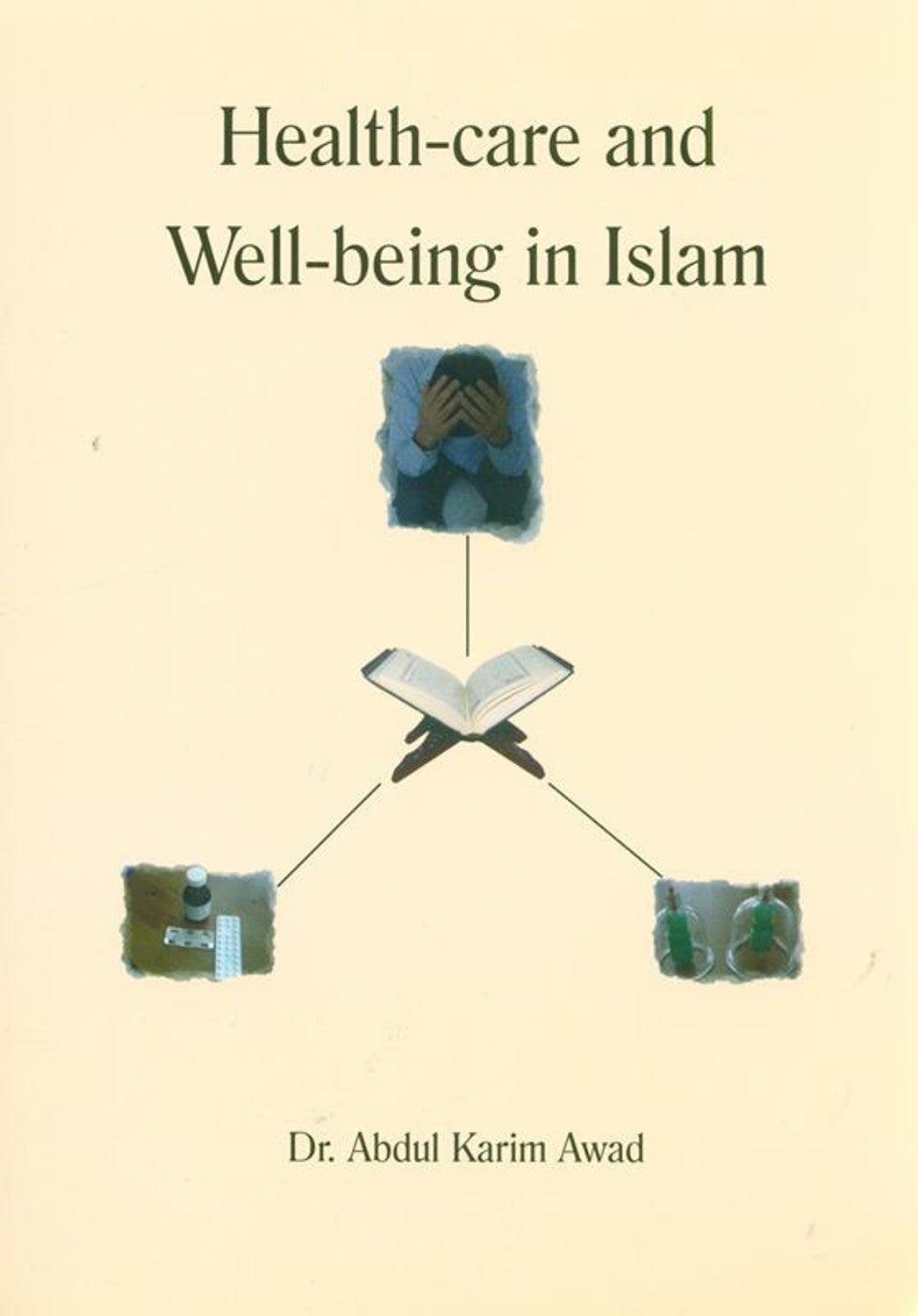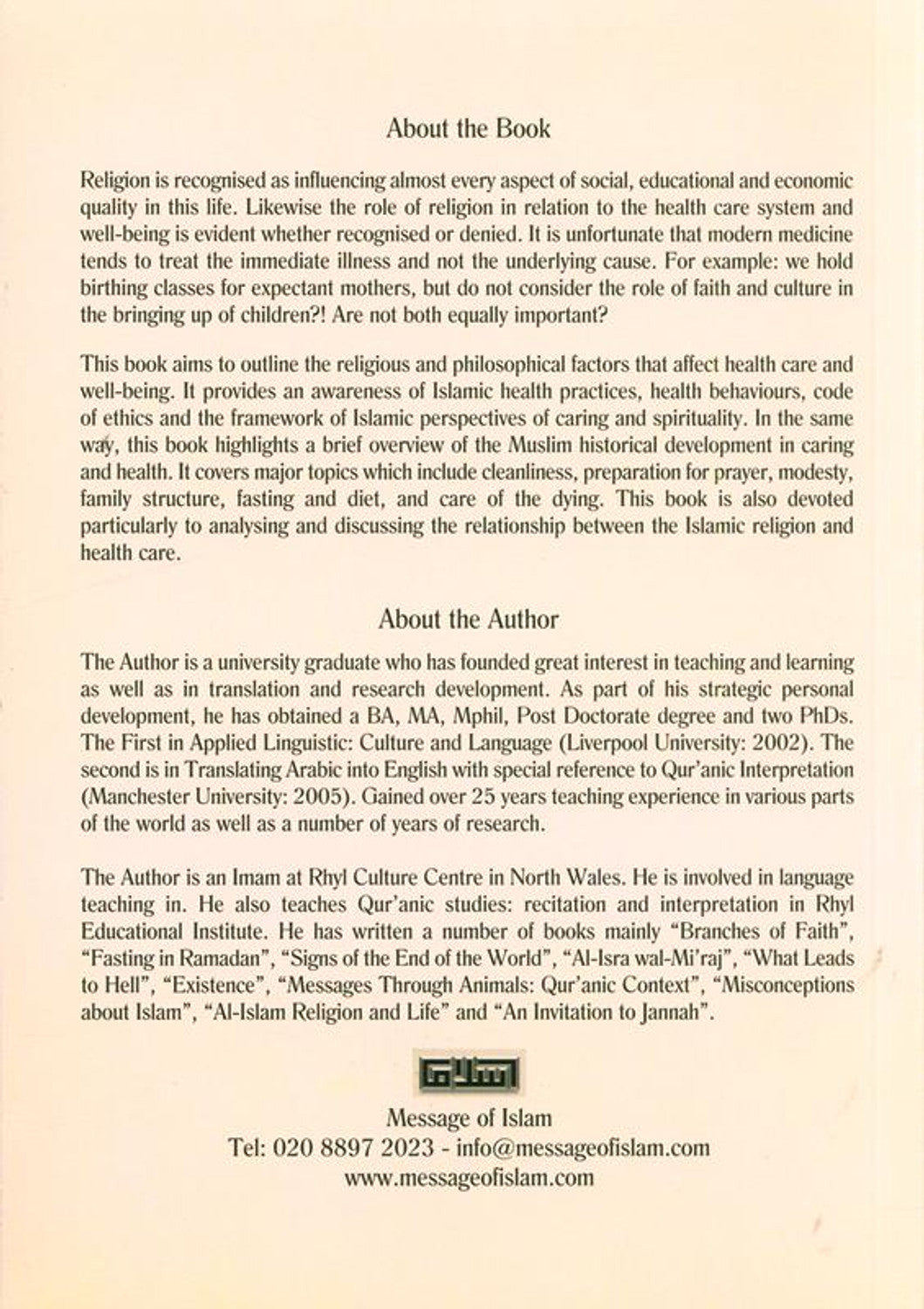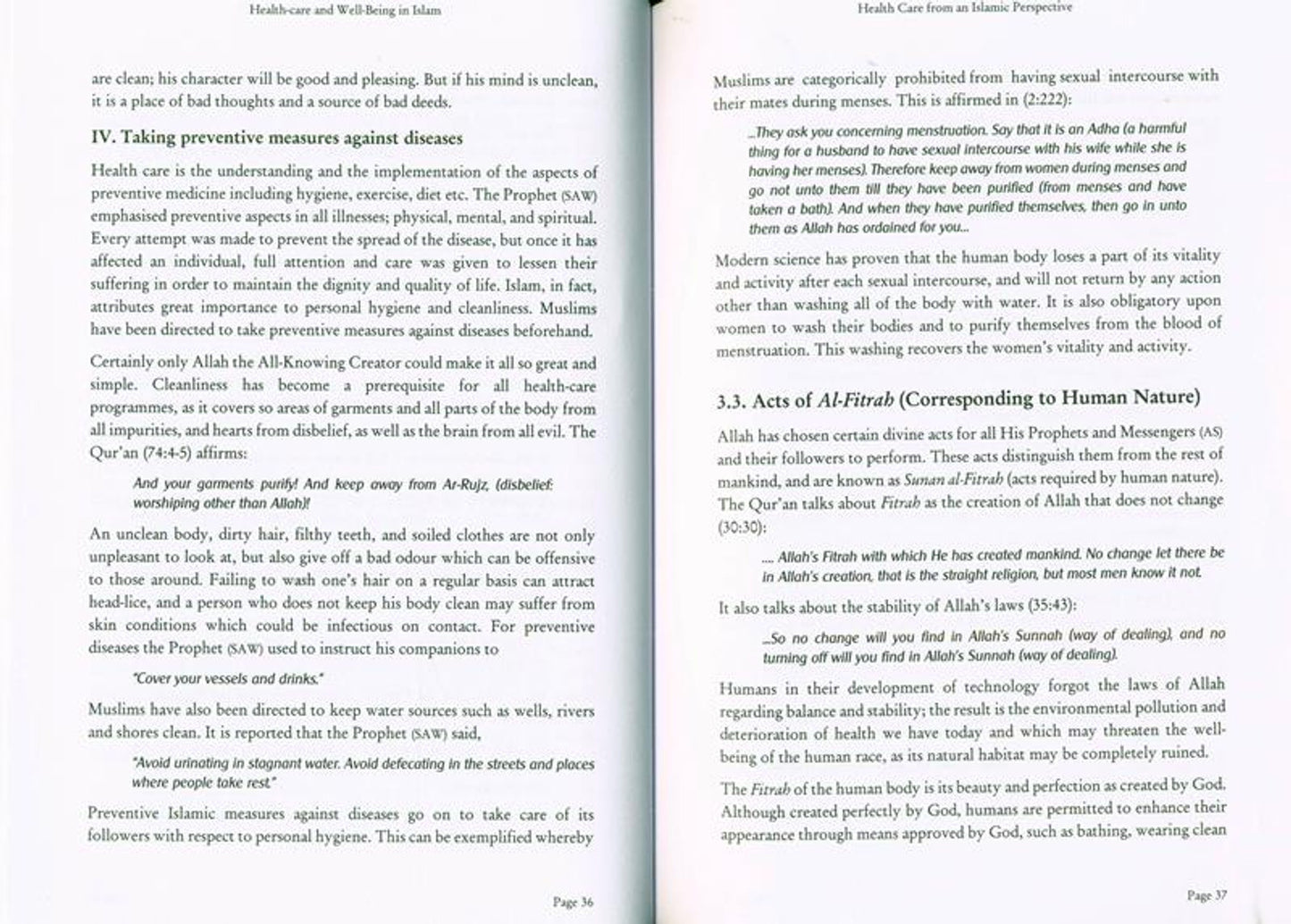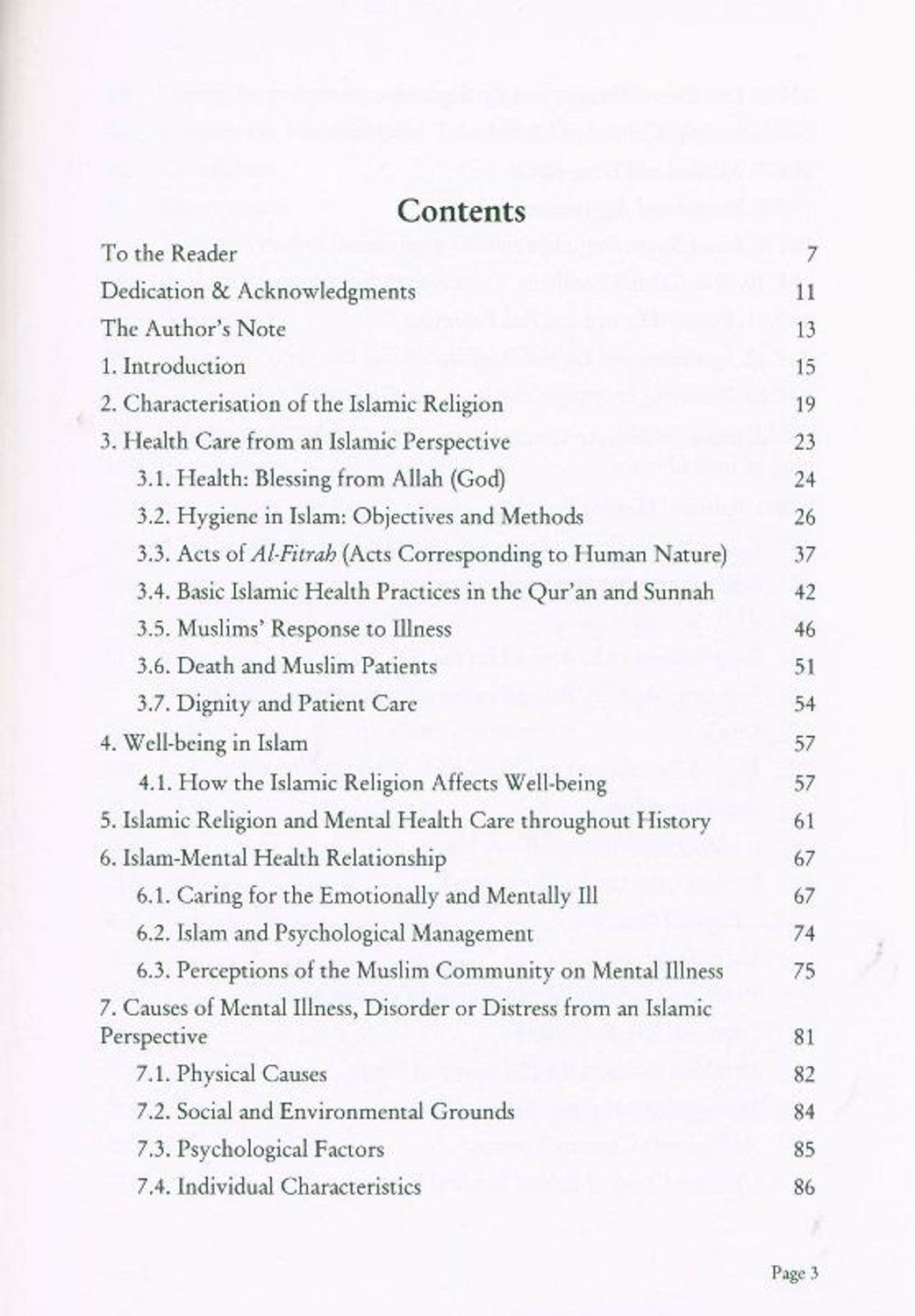Health care and wellbeing in Islam by Dr. Abdul Karim Awad
Health care and wellbeing in Islam by Dr. Abdul Karim Awad
Publisher:
Islamic Brands
Author:
Dr. Abdul Karim Awad
Language:
English
Binding:
Soft Cover
Pages: 223
Size: 15x21cm
Couldn't load pickup availability




Collapsible content
Description of Book
Publisher
Islamic Brands
Author
- Dr. Abdul Karim Awad
Sample Pages - Content
Page:01
Health-care and
Well-being in Islam
Dr. Abdul Karim Awad
Page:02
Religion is recognised as influencing almost every aspect of social, educational and economic quality in this life. Likewise the role of religion in relation to the health care system and well-being is evident whether recognised or denied. It is unfortunate that modern medicine tends to treat the immediate illness and not the underlying cause. For example: we hold birthing classes for expectant mothers, but do not consider the role of faith and culture in the bringing up of children?! Are not both equally important?
This book aims to outline the religious and philosophical factors that affect health care and well-being. It provides an awareness of Islamic health practices, health behaviours, code of ethics and the framework of Islamic perspectives of caring and spirituality. In the same way, this book highlights a brief overview of the Muslim historical development in caring and health. It covers major topics which include cleanliness, preparation for prayer, modesty, family structure, fasting and diet, and care of the dying. This book is also devoted particularly to analysing and discussing the relationship between the Islamic religion and health care.
About the Author
The Author is a university graduate who has founded great interest in teaching and learning as well as in translation and research development. As part of his strategic personal development, he has obtained a BA, MA, Mphil, Post Doctorate degree and two PhDs. The First in Applied Linguistic: Culture and Language (Liverpool University: 2002). The second is in Translating Arabic into English with special reference to Qur'anic Interpretation (Manchester University: 2005). Gained over 25 years teaching experience in various parts of the world as well as a number of years of research.
The Author is an Imam at Rhyl Culture Centre in North Wales. He is involved in language teaching in. He also teaches Qur'anic studies: recitation and interpretation in Rhyl Educational Institute. He has written a number of books mainly "Branches of Faith", "Fasting in Ramadan", "Signs of the End of the World", "Al-Isra wal-Mi'raj", "What Leads to Hell", "Existence", "Messages Through Animals: Qur'anic Context", "Misconceptions about Islam", "Al-Islam Religion and Life" and "An Invitation to Jannah".
GUM Message of Islam
Tel: 020 8897 2023 - info@messageofislam.com
www.messageofislam.com
Page:03
Health-care and Well-Being in Islam
Health Care from an Islamic Perspective
are clean; his character will be good and pleasing. But if his mind is unclean, it is a place of bad thoughts and a source of bad deeds.
IV. Taking preventive measures against diseases
Health care is the understanding and the implementation of the aspects of preventive medicine including hygiene, exercise, diet etc. The Prophet (SAW) emphasised preventive aspects in all illnesses; physical, mental, and spiritual. Every attempt was made to prevent the spread of the disease, but once it has affected an individual, full attention and care was given to lessen their suffering in order to maintain the dignity and quality of life. Islam, in fact, attributes great importance to personal hygiene and cleanliness. Muslims have been directed to take preventive measures against diseases beforehand. Certainly only Allah the All-Knowing Creator could make it all so great and simple. Cleanliness has become a prerequisite for all health-care programmes, as it covers so areas of garments and all parts of the body from all impurities, and hearts from disbelief, as well as the brain from all evil. The Qur'an (74:4-5) affirms:
And your garments purify! And keep away from Ar-Rujz, (disbelief: worshiping other than Allah)!
An unclean body, dirty hair, filthy teeth, and soiled clothes are not only unpleasant to look at, but also give off a bad odour which can be offensive to those around. Failing to wash one's hair on a regular basis can attract head-lice, and a person who does not keep his body clean may suffer from skin conditions which could be infectious on contact. For preventive diseases the Prophet (SAW) used to instruct his companions to
"Cover your vessels and drinks"
Muslims have also been directed to keep water sources such as wells, rivers and shores clean. It is reported that the Prophet (SAW) said,
"Avoid urinating in stagnant water. Avoid defecating in the streets and places where people take rest"
Preventive Islamic measures against diseases go on to take care of its followers with respect to personal hygiene. This can be exemplified whereby
Muslims are categorically prohibited from having sexual intercourse with their mates during menses. This is affirmed in (2:222):
They ask you conceming menstruation. Say that it is an Adha (a harmful thing for a husband to have sexual intercourse with his wife while she is having her menses). Therefore keep away from women during menses and go not unto them till they have been purified (from menses and have taken a bath). And when they have purified themselves, then go in unto them as Allah has ordained for you...
Modern science has proven that the human body loses a part of its vitality and activity after each sexual intercourse, and will not return by any action other than washing all of the body with water. It is also obligatory upon women to wash their bodies and to purify themselves from the blood of menstruation. This washing recovers the women's vitality and activity.
3.3. Acts of Al-Fitrah (Corresponding to Human Nature) Allah has chosen certain divine acts for all His Prophets and Messengers (AS) and their followers to perform. These acts distinguish them from the rest of mankind, and are known as Sunan al-Fitrah (acts required by human nature). The Qur'an talks about Fitrah as the creation of Allah that does not change (30:30):
...Allah's Fitrah with which He has created mankind. No change let there be in Allah's creation, that is the straight religion, but most men know it not.
It also talks about the stability of Allah's laws (35:43):
So no change will you find in Allah's Sunnah (way of dealing), and no turning off will you find in Allah's Sunnah (way of dealing).
Humans in their development of technology forgot the laws of Allah regarding balance and stability; the result is the environmental pollution and deterioration of health we have today and which may threaten the well- being of the human race, as its natural habitat may be completely ruined. The Fitrah of the human body is its beauty and perfection as created by God. Although created perfectly by God, humans are permitted to enhance their appearance through means approved by God, such as bathing, wearing clean
Page:04
To the Reader
Contents
Dedication & Acknowledgments
The Author's Note
1. Introduction
2. Characterisation of the Islamic Religion
3. Health Care from an Islamic Perspective
3.1. Health: Blessing from Allah (God)
3.2. Hygiene in Islam: Objectives and Methods
3.3. Acts of Al-Fitrah (Acts Corresponding to Human Nature)
3.4. Basic Islamic Health Practices in the Qur'an and Sunnah
3.5. Muslims' Response to Illness
3.6. Death and Muslim Patients
3.7. Dignity and Patient Care
4. Well-being in Islam
4.1. How the Islamic Religion Affects Well-being
6. Islam-Mental Health Relationship
5. Islamic Religion and Mental Health Care throughout History
61
67
6.1. Caring for the Emotionally and Mentally Ill
67
6.2. Islam and Psychological Management
74
6.3. Perceptions of the Muslim Community on Mental Illness
75
7. Causes of Mental Illness, Disorder or Distress from an Islamic Perspective
7.1. Physical Causes
7.2. Social and Environmental Grounds
7.3. Psychological Factors
7.4. Individual Characteristics
To the Reader
Contents
Dedication & Acknowledgments
The Author's Note
1. Introduction
2. Characterisation of the Islamic Religion
3. Health Care from an Islamic Perspective
3.1. Health: Blessing from Allah (God)
24
3.2. Hygiene in Islam: Objectives and Methods
3.3. Acts of Al-Fitrah (Acts Corresponding to Human Nature)
3.4. Basic Islamic Health Practices in the Qur'an and Sunnah
3.5. Muslims' Response to Illness
3.6. Death and Muslim Patients
3.7. Dignity and Patient Care
4. Well-being in Islam
4.1. How the Islamic Religion Affects Well-being
6. Islam-Mental Health Relationship
5. Islamic Religion and Mental Health Care throughout History
6.1. Caring for the Emotionally and Mentally Ill
67
6.2. Islam and Psychological Management
74
6.3. Perceptions of the Muslim Community on Mental Illness
75
7. Causes of Mental Illness, Disorder or Distress from an Islamic Perspective
7.1. Physical Causes
7.2. Social and Environmental Grounds
7.3. Psychological Factors
7.4. Individual Characteristics
Dr. Abdul Karim Awad
This book explores the connection between religion, particularly Islam, and healthcare. It highlights how faith influences various aspects of well-being, including cleanliness, prayer, modesty, family dynamics, fasting, diet, and end-of-life care. The book also provides an overview of the historical development of healthcare in Islamic culture, offering valuable insights for both healthcare professionals and those interested in faith-based care




